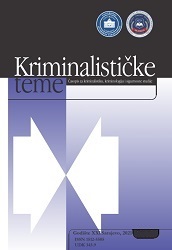The Benefits and Limitations of Using Remote Technology to Conduct Investigative Interviews
The Benefits and Limitations of Using Remote Technology to Conduct Investigative Interviews
Author(s): Kevin SmithSubject(s): Criminology, Health and medicine and law, ICT Information and Communications Technologies
Published by: Fakultet za kriminalistiku, kriminologiju i sigurnosne studije Univerziteta u Sarajevu
Keywords: coronavirus; pandemic; technology; witness; interviews;
Summary/Abstract: The risk of infection arising from face-to-face contact during the current coronavirus pandemic has contributed to an increasing interest in the use of remote technology by law enforcement organisations for the purpose of conducting investigative interviews. Such technology was used widely to interview suspected offenders who were in custody during the pandemic but law enforcement agencies in the United Kingdom were more cautious about using it with victims, witnesses and non-custodial suspects. This caution stems from concerns about the ability of interviewers to control the interview environment, build rapport and manage trauma throughout the process. This paper will review the limited research on the use of remote technology to conduct investigative interviews and considers relevant literature from other contexts (e.g., therapy) that might be used to inform the debate. While the use of remote technology can certainly offer more flexibility and greater access to justice during investigations, further research is needed into how and when it may be used safely and effectively and into identifying the situations in which using it can be productive and those in which it should only be used with caution.
Journal: Kriminalističke teme – Časopis za kriminalistiku, kriminologiju i sigurnosne studije
- Issue Year: XXI/2021
- Issue No: 3
- Page Range: 53-62
- Page Count: 10
- Language: English

